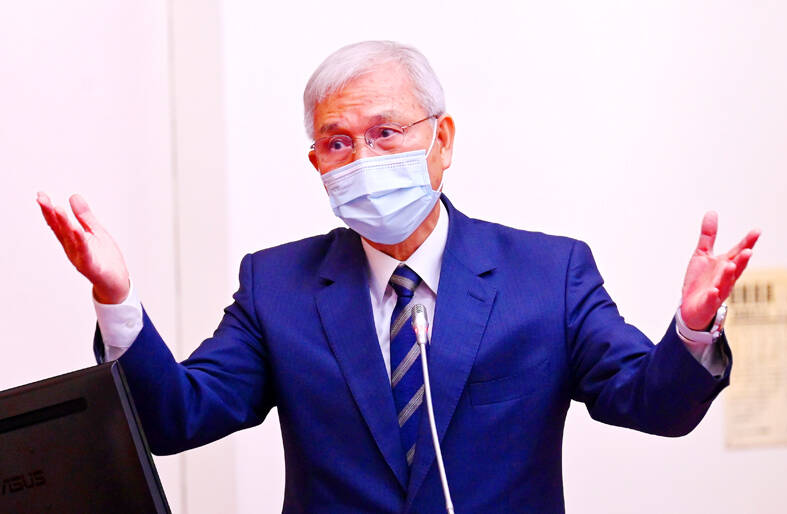Inflationary pressure in Taiwan has eased, but the central bank has no intention of cutting interest rates anytime soon, central bank Governor Yang Chin-long (楊金龍) said yesterday.
Rather, the central bank would take further steps to rein in the property market, if necessary, Yang said at a meeting of the legislature’s Finance Committee after the nation’s consumer price index (CPI) last month rose 2.42 percent from a year earlier — above the central banks’ 2 percent target — due to higher food costs.
The 4.16 percent increase in food costs had much to do with seasonal heavy rainfalls that disrupted fruit and vegetable supply and pushed up their prices, the Directorate-General of Budget, Accounting and Statistics said last week.

Photo: Liu Hsin-de, Taipei Times
However, the core CPI, a more reliable long-term price tracker because it excludes volatile items, increased 1.83 percent last month, having returned to the 2 percent target for three months in a row, Yang said.
While global central banks have lowered interest rates or plan to do so, Taiwan will not follow suit, the governor said.
Instead, the central bank will chart its own monetary policy, guided by the nation’s economic and financial interests, he said.
The central bank in March raised interest rates 12.5 basis points as it sought to quell inflation expectations ahead of electricity rate hikes in April.
Last month, the bank announced it would raise its reserve requirement ratio 25 basis points starting this month in an effort to prevent an overconcentration of real-estate loans, Yang said.
Lawmakers from across party lines have voiced concerns over steep increases in house prices induced partly by a government interest subsidy and other favorable lending terms for first-home buyers.
Rising house prices fall outside the central bank’s responsibility unless an uptrend creates bubbles and threatens the financial market’s stability, Yang said.
The system’s bad loan ratio remains at ultra-low levels and a recent stress test showed that local lenders would emerge unharmed from house price corrections, he said.
The central bank will not hesitate to take action to dampen a housing craze when it spots a need for it, the governor said, adding that the bank has tightened credit controls for purchases of luxury apartments and second homes in popular areas as well as for land financing.
Yang said he would support a pay raise for government employees to reflect economic growth, if doing so would not burden the national treasury.
In addition, a pay raise for civil servants would not fuel inflation, unlike base wage hikes that would drive up production costs for all business sectors, he said.

KEEPING UP: The acquisition of a cleanroom in Taiwan would enable Micron to increase production in a market where demand continues to outpace supply, a Micron official said Micron Technology Inc has signed a letter of intent to buy a fabrication site in Taiwan from Powerchip Semiconductor Manufacturing Corp (力積電) for US$1.8 billion to expand its production of memory chips. Micron would take control of the P5 site in Miaoli County’s Tongluo Township (銅鑼) and plans to ramp up DRAM production in phases after the transaction closes in the second quarter, the company said in a statement on Saturday. The acquisition includes an existing 12 inch fab cleanroom of 27,871m2 and would further position Micron to address growing global demand for memory solutions, the company said. Micron expects the transaction to

Vincent Wei led fellow Singaporean farmers around an empty Malaysian plot, laying out plans for a greenhouse and rows of leafy vegetables. What he pitched was not just space for crops, but a lifeline for growers struggling to make ends meet in a city-state with high prices and little vacant land. The future agriculture hub is part of a joint special economic zone launched last year by the two neighbors, expected to cost US$123 million and produce 10,000 tonnes of fresh produce annually. It is attracting Singaporean farmers with promises of cheaper land, labor and energy just over the border.

US actor Matthew McConaughey has filed recordings of his image and voice with US patent authorities to protect them from unauthorized usage by artificial intelligence (AI) platforms, a representative said earlier this week. Several video clips and audio recordings were registered by the commercial arm of the Just Keep Livin’ Foundation, a non-profit created by the Oscar-winning actor and his wife, Camila, according to the US Patent and Trademark Office database. Many artists are increasingly concerned about the uncontrolled use of their image via generative AI since the rollout of ChatGPT and other AI-powered tools. Several US states have adopted

A proposed billionaires’ tax in California has ignited a political uproar in Silicon Valley, with tech titans threatening to leave the state while California Governor Gavin Newsom of the Democratic Party maneuvers to defeat a levy that he fears would lead to an exodus of wealth. A technology mecca, California has more billionaires than any other US state — a few hundred, by some estimates. About half its personal income tax revenue, a financial backbone in the nearly US$350 billion budget, comes from the top 1 percent of earners. A large healthcare union is attempting to place a proposal before